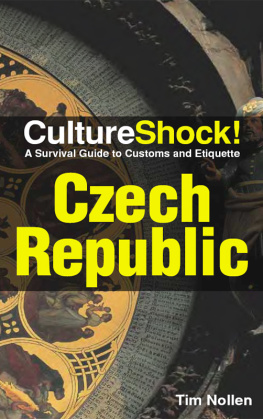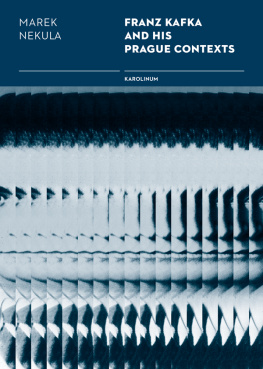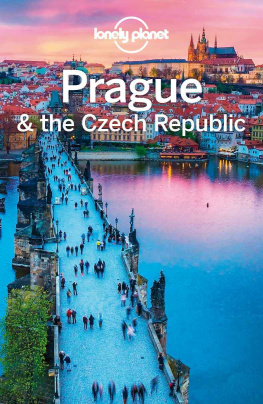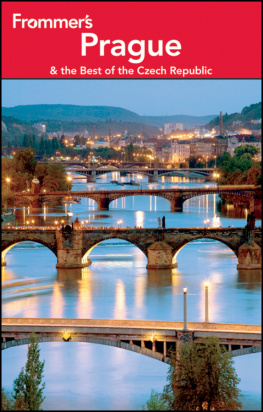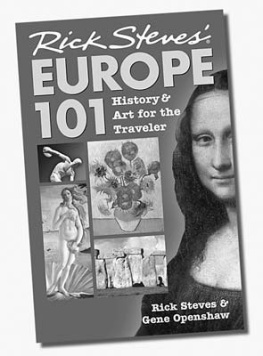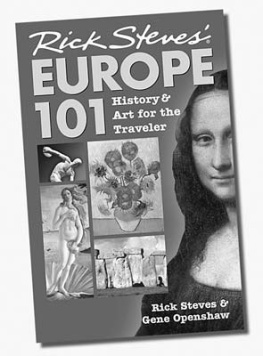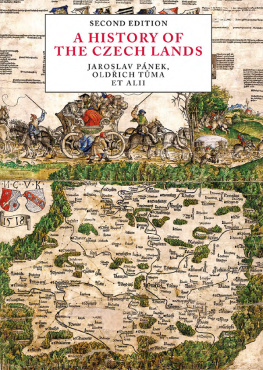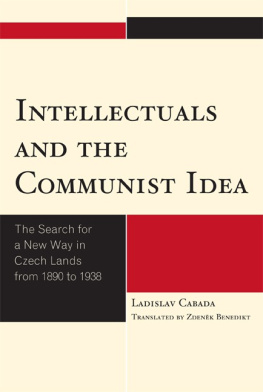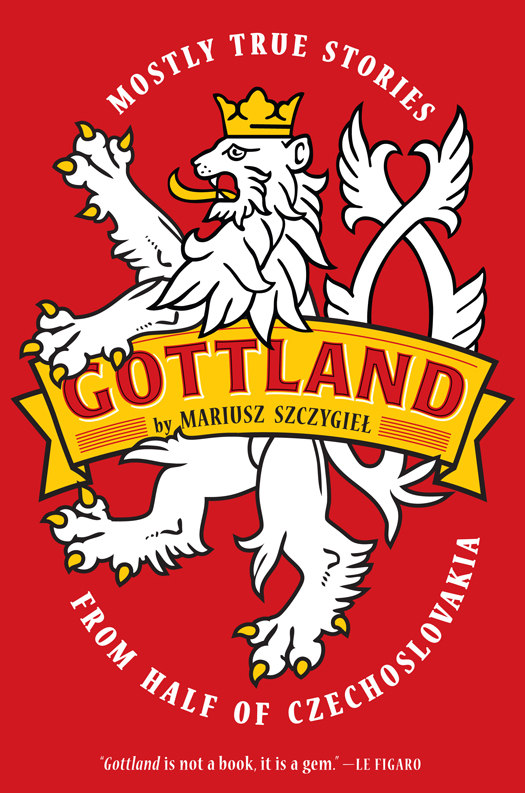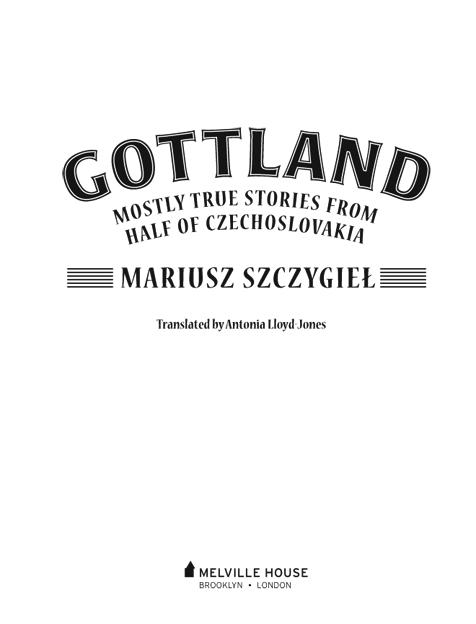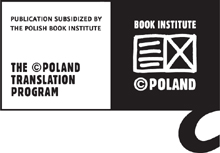PRAISE FOR
GOTTLAND
An intelligent, captivating, and much-needed book.
ADAM MICHNIK
A great book. Mariusz Szczygie is well versed in the Polish school of reportage writing and he applies his method to this specific Czech ambiguity. Original and surprising.
AGNIESZKA HOLLAND
Extraordinary, hypnotizing, and disturbing tales.
LIBRATION
If you want to understand the Czech Republic in the twentieth century, read Gottland.
FRANKFURTER ALLEGEMEINE ZEITUNG
Masterful prose impressive.
NEUE ZRCHER ZEITUNG
One of the most valuable and eloquent testimonies about the Czech people.
PRVO ( CZECH REPUBLIC )
GOTTLAND: MOSTLY TRUE STORIES FROM HALF OF CZECHOSLOVAKIA
First published in Poland as Gottland
Copyright 2006, 2014 by Mariusz Szczygie
Translation copyright 2014 by Antonia Lloyd-Jones
First Melville House printing: May 2014
Melville House Publishing
145 Plymouth Street
Brooklyn, NY 11201
and
8 Blackstock Mews
Islington
London N4 2BT
mhpbooks.com facebook.com/mhpbooks @melvillehouse
Library of Congress Cataloging-in-Publication Data
Szczygiel, Mariusz, 1966
[Gottland. English]
Gottland : mostly true stories from half of Czechoslovakia / Mariusz
Szczygiel; translated by Antonia Lloyd-Jones.
pages cm
Originally published in Polish in 2006.
Includes bibliographical references.
ISBN 978-1-61219-313-7 (hardcover) ISBN 978-1-61219-314-4 (ebook)
1. Czech RepublicAnecdotes. 2. Czech RepublicSocial conditionsAnecdotes. I. Lloyd-Jones, Antonia, translator. II. Title.
DB2011.S9313 2014
943.71dc23
2014012465
Design by Christopher King
v3.1
TIME LINE
| Before the First World War, the Czech state is known as Bohemia, and is part of the Austro-Hungarian Empire. |
| 1918 | After the First World War, Czechoslovakia is formed as an independent country. The first president is Tom Garrigue Masaryk. |
| 1938 | Nazi Germany annexes Sudetenland, an area with a mainly German-speaking population. |
| 1939 | World War IIthe Czech state is occupied by Germany. It is called the Protectorate of Bohemia and Moravia, and administered by Reichsprotektor Reinhard Heydrich. |
| 1942 | Heydrich is assassinated by the Czech resistance. |
| 1945 | Soviet and US armies liberate Czechoslovakia. |
| 194546 | The minority German populationthree million peopleis expelled from the country. |
| 1948 | The Victorious February takeover by the communists. Klement Gottwald is the countrys president. |
| Early 1950s | A period of Stalinist repression. |
| 1968 | As leader of the Prague Spring, Alexander Dubek tries to introduce socialism with a human face. |
| 1968, December | Soviet and other Warsaw Pact troops invade to crush the Prague Spring. Dubek is replaced by hard-line communist Gustv Husk. |
| 1969 | The introduction of repressive normalization. Jan Palach and other human torches self-immolate in central Prague in protest. |
| 1977 | The dissident movement publishes Charter 77. |
| 1989, November | The peaceful Velvet Revolution, led by the Civic Forum political movement, restores democracy. Former dissident playwright Vclav Havel is the first president of the newly independent country. |
| 1993 | The country splits into the Czech Republic and Slovakia. |
| 2004 | The Czech Republic joins the European Union. |
NOT A STEP WITHOUT BATA
For Egon Erwin Kisch
1882: A STINK
Why does it smell so bad in here? six-year-old Tom Bata asks his father, Antonn. This is the first manifestation of his desire to set reality straight.
We do not know what his father says in reply. He is probably quite reticent on the whole.
Cobbler Antonn Bata is married for the second time. Twice he has taken a widow with children as his wife. With each wife he has also had his own children. Altogether, at his small cobblers workshop in Zln he is raising twelve children from four marriages. Apart from that, he works with seven other people. His second wife does not like drafts.
TWELVE YEARS LATER: DEMANDS
The three children from his first marriage, Anna, Antonn and eighteen-year-old Tom, are standing in front of their fifty-year-old father. They are demanding their mothers inheritance. Theyre also suggesting that he should immediately give them whatever they are going to inherit after his death. They dont have the time to wait all those years, and anyway it is crowded at home.
They get eight hundred gulden in silver coins, and they hire four workers.
ONE YEAR LATER, 1895: THE PRINCIPLE
They have debts of eight thousand zlotys. They cant afford new leather hides and they have no money to pay for the old ones. Antonn is called up for the army, and Anna goes to work in Vienna as a domestic servant.
Tom stares at the remaining leather, and in his despair he hits upon the most important principle of his life: always turn failure into advantage.
As they cannot afford leather, they will have to make shoes out of what is available: canvas. Canvas doesnt cost much, and the rest of the leather can be used to make soles. This is how Bata devises one of the great successes of the new century: canvas shoes with leather soles. He brings in several thousand orders from Vienna, all gathered in a single day. People start to call the shoes batovky.
This allows him to build his first small factory, where fifty men work in a space of two thousand square feet.
1904: QUESTIONS
The workers notice that he can never be calm. He is always so stimulated that other people feel exhausted in his company.
He reads a newspaper article about some machines being made in America. He sets off for the States, and in Lynn, Massachusetts, a shoe-making city, he hires himself out as a worker at a large factory. He takes three of his employees with him, and each one finds employment at a different place. He gives them orders to monitor each stage of production closely. Every Saturday the four shoemakers from Zln meet up at a saloon, where they exchange observations.
They are amazed that, in America, even small children do their best to earn their own keep. What makes the biggest impression on Bata is a six-year-old boy who goes from house to house, catching flies in exchange for payment.
Some people are dying of poverty, but others bake fritters in the street and sell them for one cent. Tom notices a curious feature of the Americans: they can adapt en masse to any kind of novelty humanity has managed to invent.



